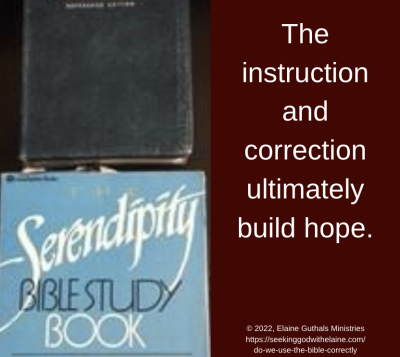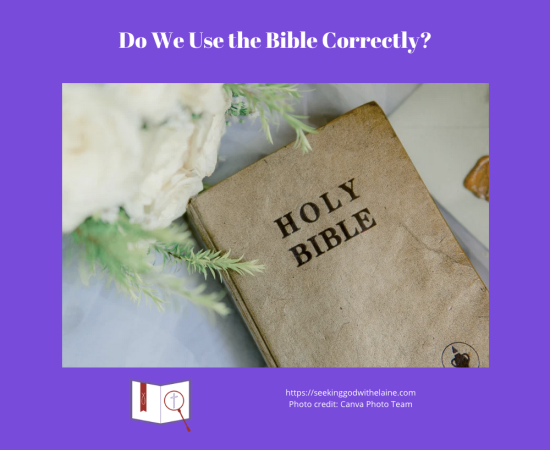The Bible is our instruction book. God has given it to us so that we can have something tangible when we are seeking Him. This daily devotional questions if we use the Bible correctly when the rough patches come.

"All Scripture is breathed out by God and profitable for teaching, for reproof, for correction, and for training in righteousness, that the man of God may be complete, equipped for every good work" (II Tim. 3: 16-17 ESV)
We hit a rough patch in our road, and what do we do? We open our Bible to get direction on what we should do. That is good.
But are we really focusing on God or on a band aid for our current troubles? Are we just wanting validation that He is going to make everything better? Like five minutes ago?
If we are just going to the Scriptures to use as Ben Gay, we are probably going to be very picky and choosy about what we are going to read. We don’t read passages that we don’t think will speak to our situation.

Then sometimes we stop reading a passage because it is stepping on our toes. If some part does try to correct us, well, we’ll just quit reading that!
Have you ever done that? I have. We have a tendency to want to skip the hard parts.
Why That Is Wrong
The problem is that, when we just read select sections, we don’t hear all that the Scriptures are trying to tell us. We don’t see the total picture of Who God really is.
When we pick and choose, we may not be adequately equipped for every good work. That makes it harder for us and sets us up for potential failure.
Now, I have a confession to make. I haven’t read the Bible through. Don’t think I am just calling you out because I am talking to myself, too.
I am trying to remedy that, but I keep getting behind. I know I need to do this because there are some very good reasons for reading the Bible through on top of getting a better understanding of Who God is.
Benefits of Using the Bible the Correct Way
We need the Bible for nourishment. Deuteronomy 8: 3 says, “He humbled you by letting you go hungry; then he gav e you manna to eat, which you and your ancestors had not known, so that you might learn that man does not live on bread alone but on every word that comes from the mouth of the LORD” (CSB). We need to hunger for His Word like we do pizza and chocolate but realize we have to eat the vegetables, also.
One thing Paul left out in his passage to Timothy was the result. The instruction and correction ultimately build hope. “For whatever was written in former days was written for our instruction, that through endurance and through the encouragement of the Scriptures we might have hope” (Rom. 15: 4 ESV). Scriptures were given to us so that we could have hope in the Lord.

We know that faith has a strong correlation with hope. “Now faith is the reality of what is hoped for, the proof of what is not seen” (Heb. 1: 1 HCSB). To me, that is an interesting translation.
I had never seen it translated reality before. I had seen assurance and substance.
Confidence is another word. But not reality.
When we use the word reality these days, it is usually in the context that something actually happened that was different than our thinking. This was the truth, rather than the fiction that we previously had believed.
So, let’s put it in the context of the sentence. Faith is the truth rather than fiction of what we hope for. Faith is built on a foundation of an accurate picture of what we anticipate.

Making the Connections
What do we anticipate? Jesus coming again. Living with God in heaven throughout eternity. Maybe we have faith that God is working in a particular situation.
I went through a time of spiritual tornado where I knew beyond a shadow of a doubt that God was working. My faith was made stronger because I had confidence the outcome would be reality, not just wishful thinking.
How Do We Apply This?
To use the Bible correctly, we have to read it — all of it. That will build our confidence as we begin to anticipate what is truly going to happen. We have to hunger for what it will tell us, even when it steps on our toes. We have to lose ourselves in God’s Word.
Father. We are so blessed. You have given us Your Word to use as a way to learn more about You. You have given us guidelines as to how You want us to live. Forgive us when we do not take advantage of this resource. Bring us to passages that we need to hear, even when they make us uncomfortable. Help us to address the issues that need to be addressed. Most of all, strengthen our relationship with You. Amen.
What do you think? What strategies have you found that help you consistently read God’s Word? Leave me a comment below (about this or anything else) or head over to my Facebook group for some interactive discussion.
If you have not signed up for the email providing the link to the daily devotion and the monthly newsletter, do so below.
If God has used this devotion to speak with you, consider sharing it on social media.
Yes, I agree, Elaine. Tough times have only served to strengthen my faith as well! And I love your emphasis on persevering in studying God’s word. My time in God’s word has grown to become my favorite part of my day. But it wasn’t always that way! Thanks for this great challenge and your vulnerability too!
Thanks for your kind words, Beth. Unfortunately, we don’t start in our devotional time and keep going up from there. We do have to persevere because we ebb and flow. We have a loving God Who understands and always wants better from us and for us.
Pingback: Who Wrote the Scriptures? – Seeking God with Elaine